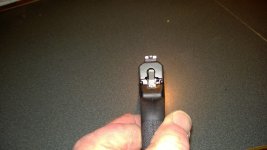Regarding the penetrator comment, I don't think I would want to go on the record about the ability to penetrate a person. I have my handguns around so that I can stop any threat to me or my family. If that stopping includes the need to penetrate - then, so be it. But, the primary reason is to stop the threat - and hopefully that means the bad guy runs out the door unharmed. Just my $.02 ...
It's a matter of knowing how a handgun works.
Most DGUs don't involve shooting. Brandishing the gun is usually enough to produce the desired result -- a stop to the grievous imminent threat. This is a psychological stop.
Most rounds fired don't hit the intended target. It makes sense that some misses will produce a psychological stop.
The typical hit is more likely to produce a psychological stop than a physiological stop, based on the known poor accuracy that is on display in the average gunfight.
A psychological stop is as good physiological stop, but in the case where the bad guy is determined, adrenaline-infused, psychotic, or drug-addled, a physiological stop may be necessary. If your carry system is not capable of producing a physiological stop, that system is suboptimal at best.
A system capable of producing a physiological stop is one that:
- allows for adequate penetration to reach highly vascularized vital organs, and
- can deliver the adequately penetrating projectiles accurately (this is more about the shooter than the gun for typical defensive handgun shooting distances).
In addition, the bigger the hole the better (more potential for vital tissue disruption, and the more disruption the quicker the target bleeds out and stops), and the more holes the better. Bigger holes are made by using wider bullets or expanding bullets. More holes are possible with a higher capacity sidearm. Wider bullets means less capacity, and care must be taken to ensure that reliable expansion is not achieved at the cost of reducing penetration to an inadequate degree.
Most people incorrectly conclude that accuracy is the most important element of a defensive handgun system (shooter, sidearm, and cartridge). However, consider a perfectly accurate Nerf gun -- it can never produce a physiological stop. On the other hand, consider a tyro shooter that has difficulty hitting a barn door -- given a gun loaded with adequately penetrating cartridges, this shooter can produce a physiological stop if he's lucky. Thus, penetration is the most important criterion in selecting and conditioning your system.
A winner wins because he does not prepare to prevail in just the average encounter. He prepares for a worse-case encounter. That means preparing to produce physiological stops.
On average:
- Most people will never be threatened with grievous harm; thus, the average person has no need to carry a sidearm.
- Most DGUs will be won simply by brandishing one's sidearm; thus, the average carrier can get by with an Airsoft pistol or an unloaded pistol.
- Most shootings likely produce psychologic, not physiological, stops; thus, the average carrier can get by using ineffective frangible (poorly penetrating) ammunition.
But, if you've opted to carry, it makes sense to carry something that can prevail in a reasonable worse-case encounter where a physiological stop is required. This is fundamental risk management.


